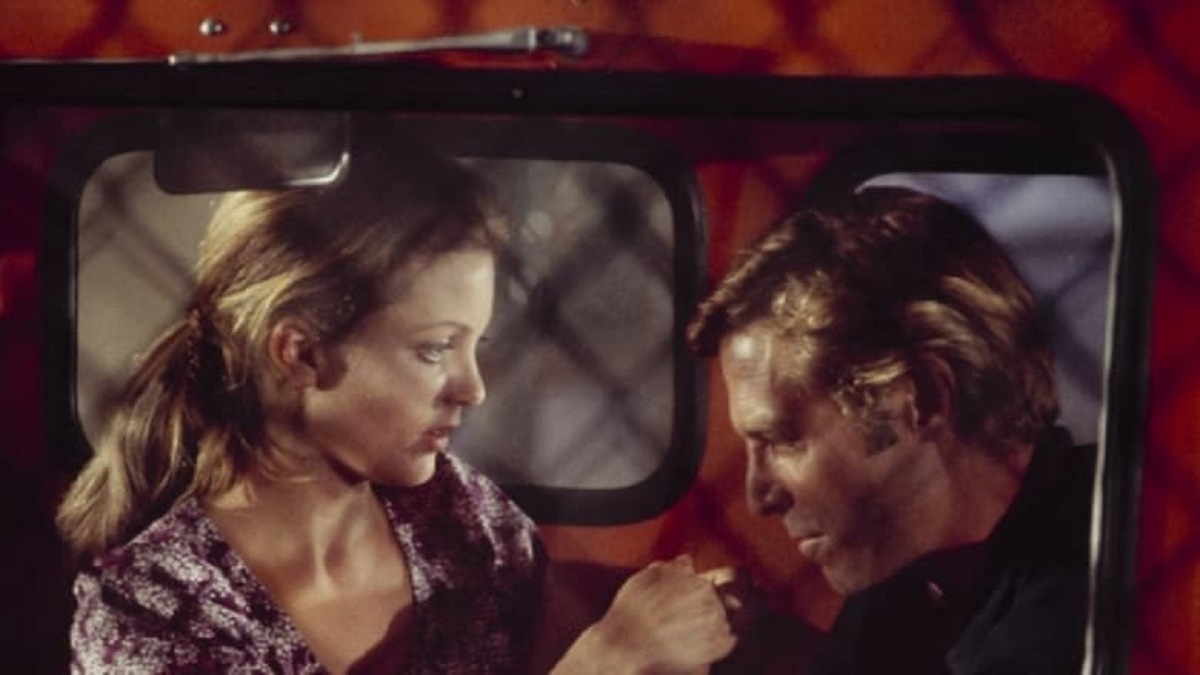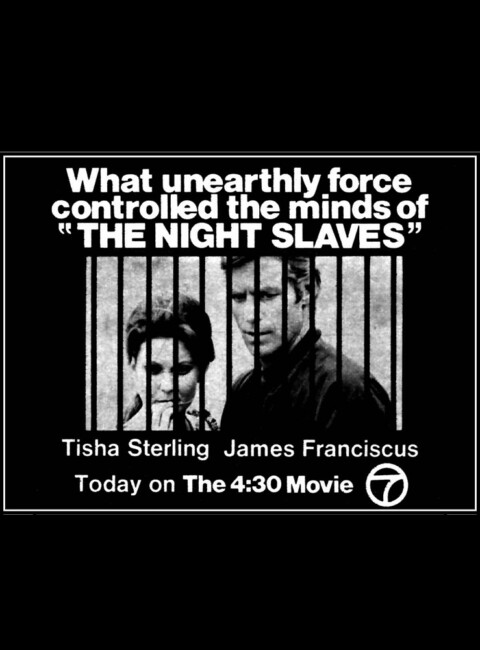Crew
Director – Ted Post, Teleplay – Everett Chambers & Robert Specht, Based on the Novel by Jerry Sohl, Producer – Everett Chambers, Photography – Robert B. Hauser, Music – Bernardd Segall, Special Effects – James L. Klinger, Art Direction – Howard Hollander. Production Company – Bing Crosby Productions
Cast
James Franciscus (Clay Howard), Lee Grant (Marjorie Howard), Tisha Sterling (Annie Fletcher/Nallil), Leslie Nielsen (Sheriff Henshaw), Andrew Prine (Fess Beany/Noel), Scott Marlowe (Matt Russell), John Kellogg (Mr Fletcher), Cliff Carnell (Deputy Spencer), Morris Buchanan (Mr Hale)
Plot
Clay Howard is recovering from a car accident after which surgeons had to implant a steel plate in his head. He and his wife Marjorie go to the small California town of Eldrid to recover, although their marriage is under strain. Signed into a hotel there, Clay is baffled to watch out the window after nightfall as everybody in the town, including Marjorie, sleepwalks into the back of a pick-up truck and is driven off. In the morning, neither Marjorie or any of the townspeople can remember anything and think Clay is crazy. On successive nights in which he sees the same thing happen, Clay meets a woman who appears to be unaffected and knows what is happening. As the two are attracted to one another, Clay learns that aliens have crashlanded near the town and the townspeople are being taken over at night to conduct repairs to their ship.
US TV movies (and mini-series) of the 1970s are often an amazing treasure trove of largely unexplored genre material. Science-fiction in particular did some unique things in this period. This was the era of films like The Love War (1970), A Cold Night’s Death (1973), The Questor Tapes (1974) and Where Have All the People Gone? (1974). Steven Spielberg made Duel (1971), while other works like The Night Stalker (1972), The Night Strangler (1973), Frankenstein: The True Story (1974), Trilogy of Terror (1975) and Salem’s Lot (1979) did more sophisticated things with horror material than most theatrically-released films of the era. (See TV Movies for a more detailed listing).
Most of these science-fiction tv movies can be seen to be taking themes from 1950s science-fiction films and turning them in far more conceptually refined directions. Night Slaves plays out like a variant on a 1950 alien body snatchers film – one is reminded in particular of the mind-controlled parents in Invaders from Mars (1953), while the plot about the aliens taking on human form to repair their ship has a number of similarities to It Came from Outer Space (1953). The small town where someone returns/visits from outside to find that something sinister is happenings to the residents became a standard trope of the genre from Invasion of the Body Snatchers (1956) onwards. (For more detail see Body Snatchers).
Night Slaves does a solid and effective rehash of the basics. Ted Post is never much more than a routine director and you cannot help but feel how much more atmospheric the film would have emerged under the hand of Don Siegel, William Cameron Menzies, Jack Arnold or any of the directors of the original 1950s body snatchers fad. Certainly, while it could have benefitted from far more in the directorial department, the film is carried by the unusualness of the concept and arrives at an ending that certainly does not go in any cliche directions.

Night Slaves was one of a handful of films made by director Ted Post (1918-2013). Post had begun directing in the days of early live television and worked on classic shows such as Gunsmoke, Perry Mason, Wagon Train, Rawhide and Peyton Place as well as classic genre anthology shows like The Twilight Zone (1959-63) and Thriller (1960-2). He directed such films as Hang ‘Em High (1968), the Dirty Harry sequel Magnum Force (1973) and Go Tell the Spartans (1978). Within genre material, Post also made Beneath the Planet of the Apes (1970), which first paired him with James Franciscus; the weird psycho film The Baby (1972); and the chemical warfare comedy Whiffs (1975).
The film was based on a 1965 novel by mystery and science-fiction writer Jerry Sohl. Sohl wrote several other science-fiction novels and scripts for numerous tv series during the era, including episodes of Alfred Hitchcock Presents (1955-62), The Twilight Zone (1959-63), Star Trek (1966-9) and The Invaders (1967-8), as well as the films Die, Monster, Die (1965), Curse of the Crimson Altar (1968) and the English-language script for Toho’s Frankenstein Conquers the World (1966).


